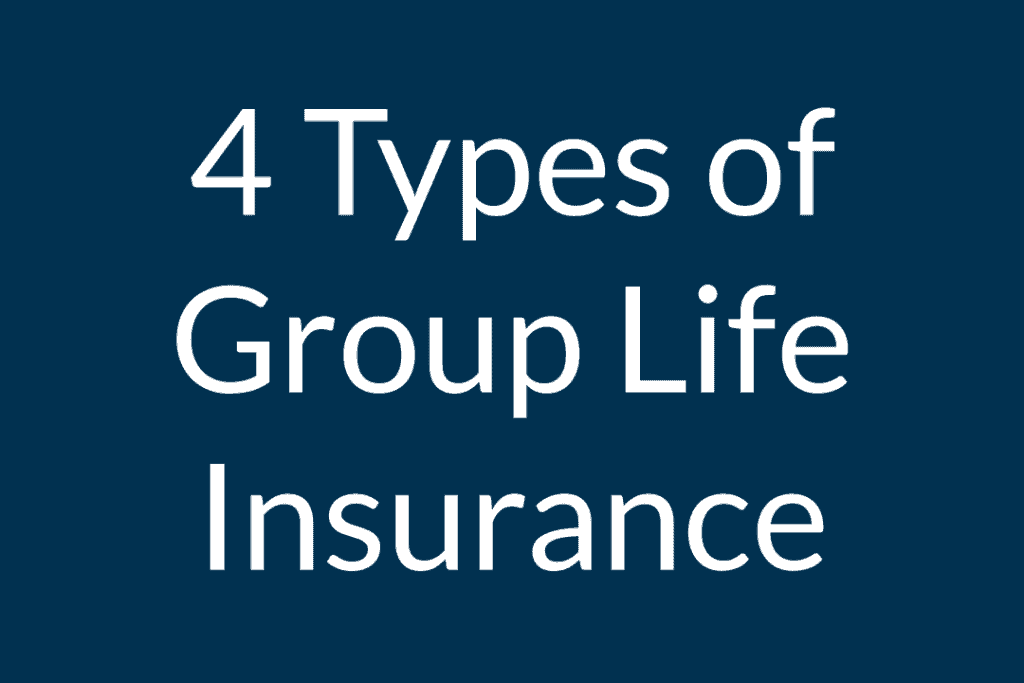Group life insurance is the most common life insurance benefit offered at work. There are four types of group life insurance that you may see offered through employers. The four types are:
- Basic group term life insurance – Basic group term life insurance is usually employer paid. However, there are sometimes that employees may have to contribute a nominal amount to the cost of the coverage. This is the most common group life benefit. While it normally only covers the employee, some employers do also provide a small amount of basic dependent life coverage for spouses and children.
- Supplemental group term life insurance – Supplemental group term life insurance is additional term life insurance that employees can purchase on themselves, their spouses or on their dependent children.
- Accidental death and dismemberment insurance – Accidental death and dismemberment insurance is sometimes shortened to AD&D. AD&D coverage can be offered in one of two ways. It can be included in the basic and supplemental life benefits or it can be offered as a standalone program. However, the AD&D life insurance is only paid out if the insured dies in an accident or qualifies for a dismemberment benefit such as losing an arm or other dismemberment benefit.
- Permanent life insurance – Permanent life insurance is life insurance that is designed to last your entire life. Typically, permanent life insurance is either a whole life contract or a universal life contract.
Advantages of Group Life Insurance
Group life insurance is a valuable benefit for employees. Here are some advantages to this benefit:
- Employer paid – Basic life insurance is usually employer paid which gives the employee a benefit at no cost to the employee.
- Guaranteed issue – Group life insurance provides guaranteed issue options. This means that employees can enroll with out medical questions upon their initial enrollment..
- Group rates – Since the employer negotiates the rates as a group, their may be some cost savings to the employee.
- Portability – Supplemental group term life and permanent life insurance options may provide some portability options that allow you to continue coverage if you leave your employer.
Disadvantages of Group Life Insurance
Even though group life insurance is a great employee benefit, there are some downsides. Here are some of the disadvantages of group life insurance.
- Employer owned – Group life insurance is owned by the employer. This means the employer can decide to change or terminate the benefit at any time. It also means that if you leave your employer your coverage may end leaving you without life insurance when you need it most.
- Basic group term life insurance typically ends when you leave or retire from your employer – If you rely on the life insurance your employer give you, you may not have it inforce when you need it.
- Supplemental group term life insurance rates increase as you get older – Typically, supplemental group life rates increase in 5 year increments so as you get older, the rates will increase. Eventually, it may become more expensive than you will want to pay.
- Age reduction schedule – With the exception of group permanent life insurance, most group term life insurance isn’t meant to last your entire life. Once you reach older ages, like age 65 and up, the life benefit amount will begin to reduce. This age reduction schedule often catches employees by surprise.
- Conversion options are limited/expensive – If you want to convert you group life insurance to an individual whole life policy, options are limited. Since the most common employee looking to convert can’t get coverage elsewhere, the premiums are also higher. The premiums may also be higher because you don’t have the option to convert until you leave employment. This may be when you are older and in your 60’s and 70’s when premiums are naturally going to be more expensive.
- Most employees outlive their group life insurance – Since basic and supplemental term life insurance is term insurance, it is only designed to last for a certain time period. This time period is when the employee is a member of the group as an employee. Even if the group life insurance has a portability option, that doesn’t mean it is permanent coverage. It will expire at a certain point. Then, when you need it most, it won’t be there for you.
In Conclusion
Group life insurance is a valuable employee benefit that many employees take advantage of. While it is a great benefit option, most employees will normally outlive the coverage that they get through the employer.
It would be a good idea for most employees to have at the very least, an individual permanent policy that they can use to pay for their funeral after their group life insurance expires.




